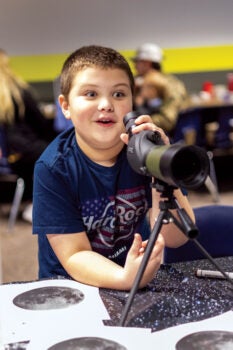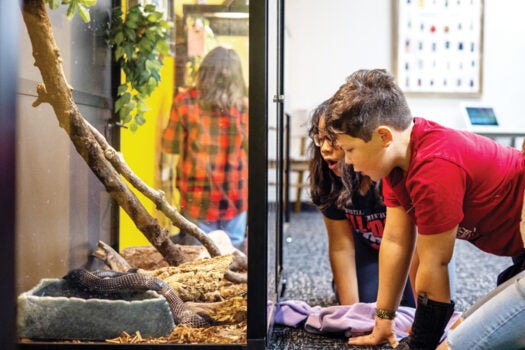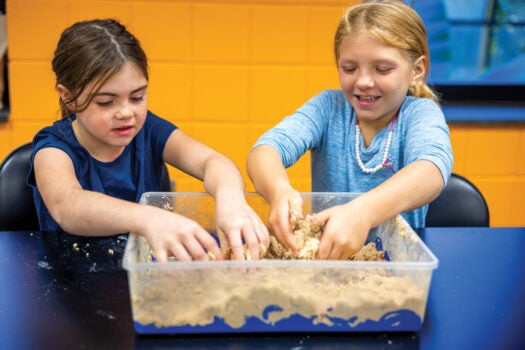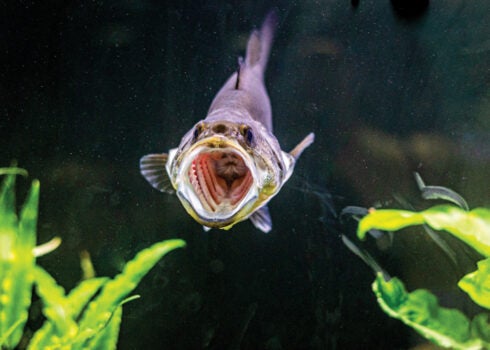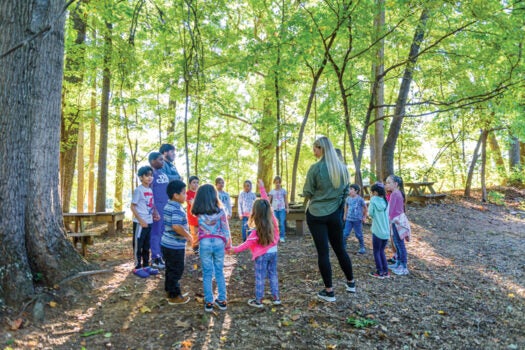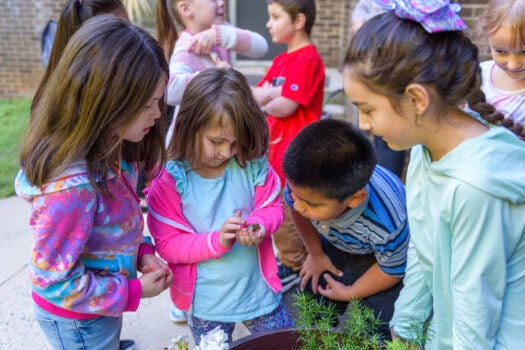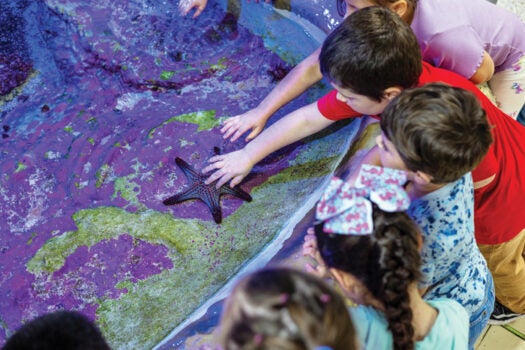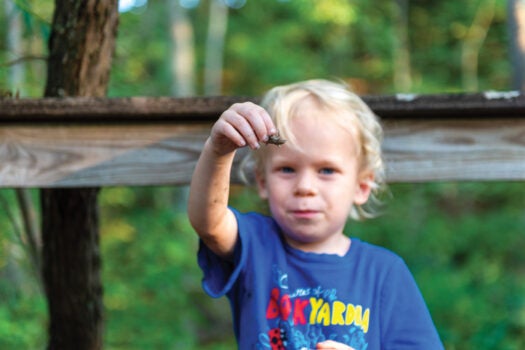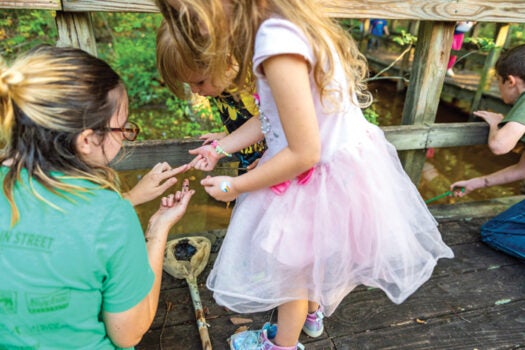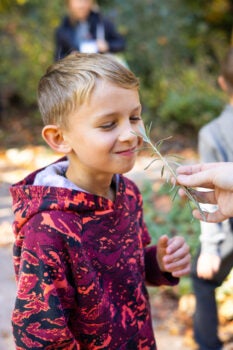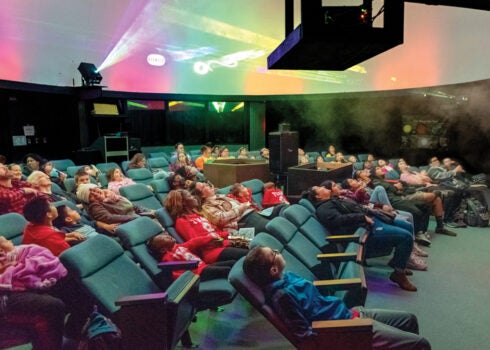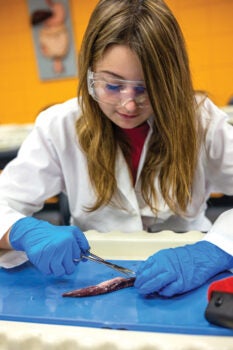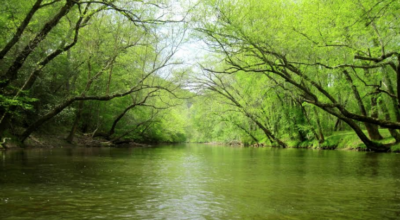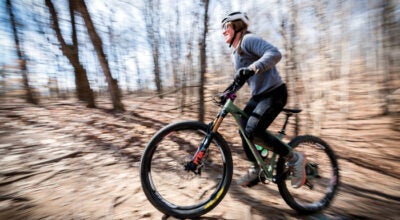Spirit of Rowan: Explore and expand your horizons
Published 12:00 am Sunday, March 24, 2024
SALISBURY — Imagine being able to visit a rainforest, outer space and the wetlands, all without leaving Rowan County. Students can do all this and more at Horizons Unlimited and Science, 1636 Parkview Circle, Salisbury.
The center, which was founded in 1967, offers multiple opportunities for students of all ages to have a hands-on science experience.
One of the rooms where this can happen is Horizons touch pool room, which has a 1,300-gallon saltwater pool with starfish in it that they can not only see but can touch along with viewing sea urchins and a variety of fish.
Elise Tellez, director of Horizons Unlimited, said that this room “is a big hit because a lot of our students here in RSS don’t often get a chance to leave the county.”
So when the students are learning about ecosystems and animal adaptations, “it’s really cool for them to get the chance to visit here and put their hands in the salt water.”
Another place that the center offers visitors to see that they may never experience is a tropical rainforest, simply by walking through a doorway.
“It’s one thing to read about a rainforest,” Tellez said. “It’s another to know what it feels like.”
Therefore, this one, she said, is an interesting experience and is set up complete with many tropical plants, a waterfall, some frogs and even some rain. Plus, it’s temperature-controlled to simulate what it would be like in the actual rainforest.
In addition to the animals in the touch pool room, children can visit the adjacent room where they can see and learn about various land animals.
Tellez said they have “quite a collection of animals,” both aquatic and terrestrial, including turtles, a bearded dragon named Taz, a lavender corn snake, lizards, toads, some snakes, all kinds of fun critters and a couple of insects.”
Emily Hitzfelder, science and animal care specialist cares for the animals, which “serve a great purpose helping people of all ages learn about their ecological value and also their animal adaptations,” Tellez said.
When children enter these rooms and see the animals, Hitzfelder said that their reaction is one of excitement and awe for the most part.
“It is really cool because (for) a lot of folks, there’s a bad reputation for snakes and spiders and things like that. So it’s really cool for them to be able to see them up close and in a safe environment where these animals have been around for a long, long time and feel comfortable with us taking care of them. They just love making those observations, getting to experience the animals.”
Tellez shared that they can teach about adaptations and mutations as the children see the animals, noting that the color of the lavender corn snake makes it more difficult for it to survive in the wild and blend in and camouflage.
“So it’s really cool to show the kids the difference between an adaptation and a mutation,” she said, and there are tons of things they can touch; we want them to make observations and explore,” which is at the heart of the entire center.
“It’s centered around hands-on science exploration. We believe that in science education, kids learn best by doing and getting to experience a lot of these science concepts, which helps them really retain that knowledge,” she said.
Tellez said there is a lot of research that shows both outdoor and hands-on learning helps children not only academically but also with their social and emotional development.
The Curiosity Room was next door, a big room which offers space for lots of different activities. One day, it became a shadow lab where students could learn about shadows and lights, shapes and darkness and shadows on the moon. Another time, it served as an open space for the children to explore robotics.
On the other side of the building, which Tellez shared was the first phase of Horizon in the ’60s and ’70s, was the Margaret C. Woodson Planetarium.
There, students can explore the universe and see the earth from space, take a trip to the different planets, go to the moon and even land on it, as Summer Howerton, science and communications specialist, pointed out, as they have a new digital star system which allows for all kinds of unique experiences.
In addition to studying the universe in this room, Tellez said they could also explore the underground and the sea using their 4K projector, where full dome shows can be watched.
“One of my favorites,” she said, “is Habitat Earth, where you can be flying in the sky with birds and then all of a sudden you are underground in tunnels with the ants, and then you are right next to sea otters in the ocean. So it’s just a really cool way to explore ecosystems and all of their interconnectedness as well.”
And being at the planetarium could also “motivate a student to want to become an astronaut and say, that’s cool, I want to do that,” she continued.
On one wall in the building is a full-size mural of a wetland along with animals native to North Carolina, allowing children to see and learn about another ecosystem.
Horizons Unlimited also houses a science lab where students can participate in different projects and have additional learning opportunities.
Coming up, Tellez said that the Rowan County eighth graders would be participating in a full-day water lab experience visiting Spencer Woods, learning about water quality, chemical water testing, gathering macroinvertebrates, building water filters and more.
Hitzfelder said she loved doing water studies with the students. “First off, gathering macroinvertebrates, yes, the science is cool, but just the fact of giving kids a net and they get to be a kid outside, which doesn’t happen very often these days, and just getting to explore the water and find these insects that look like aliens.”
Howerton agreed as she said, “I think it’s really cool that eighth graders get to spend the whole day outside. It’s not often when they get to spend the whole day from morning till they go home.”
Their outdoor space is another classroom option, with the picnic area and nearby trail, which Tellez said is a little more than a mile loop that offers an “interesting, diverse ecosystem. It loops down, and we have a beautiful wetland, which is great to talk to kids about how valuable wetland areas are for naturally filtering water as well. And it’s great that we have wonderful neighbors,” as their preserve backs up to the Catawba Ecological Preserve and Salisbury greenway.”
The trail is also open to the public on weekends, so anyone can come and enjoy the area.
Tellez said the public could also attend some entertainment times at the planetarium as they offer laser light shows to go along with the music.
Some of the shows include a Queen light show, The Beatles and more.
Owned and operated by the Rowan-Salisbury School System, Horizons Unlimited is the science curriculum department of the schools.
“I like to think of us as the hub of all science resources for RSS.”
And while they primarily serve RSS, with about 75-80 percent of the students being RSS kids, she said if another district wants to come, they can. It’s on a first-come, first-served basis, as visits must be scheduled and get on Horizon’s calendar.
Tellez said they are not there to take the place of a science class or concept but to “supplement it, enhance it, whether it’s a fun way to introduce a concept or a great way to review it. We want to showcase a great way to teach hands-on science and really help make that connection when they get back in the classroom.”
In addition to the programs for students during the school year, they also offer several programs for the public, including one coming in April to celebrate the eclipse, and a variety of summer camps, including two-day camps, a survival camp and an art camp, both in June, and week camps, which include a cooking camp in June; ecosystems camp and zoology camp, both in July.
Family Fun Friday events are also available, offering a space quest on June 21 and a Botany Bash on July 26. Cost is $8 per person.
New is their Leader in Training for youth 13-15. It is free and teaches them how to become a leader.
If traveling or visiting the center is not an option, Tellez said they offer Outreach programming as there are some suitable to take on the road to the school.
They have also developed kits that have hands-on activities, “making it really approachable so if a teacher opens up a box, they could execute these hands-on lessons to teach a concept.”
The center is for all ages. As Tellez said, they have had college students come and participate, and some from Trinity Oaks Retirement Living Center have come for the planetarium shows and other activities.
“We have said in the past that we serve pre-K to gray.
In our mission statement, we say we are all about empowering learners to engage in science. Anyone can be a learner, whether you’re five years old or 65 years old. It does not matter.”
Horizons Unlimited has been around for quite a long time, Tellez said, and has a long history of great work and is “proud to be a part of this organization.”
For additional information about their seasonal schedule, summer camps, laser shows and other events, visit Horizon Unlimited’s Facebook page.


